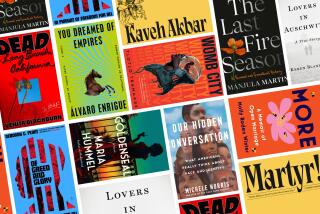Innocent lost
- Share via
EACH year, about 12,000 Nepali girls are sold into sexual slavery by their families and forced to work in Indian brothels. “Sold” is the story of one such girl -- 13-year-old Lakshmi, who believed she would be working as a maid to earn money for her mother but was locked in a brothel, turning tricks against her will without a cent going home.
“Sold” is a work of fiction, but it reads like a true story because it is so well researched and intimately told. Not only did author Patricia McCormick travel to remote Nepali villages to trace the path many young girls take to Calcutta’s red-light district, she also interviewed sex slavery survivors and members of groups that rescued them. The result is a terrifyingly realistic coming-of-age story, one that’s even more powerful because it is told in the present tense, from Lakshmi’s naive point of view.
Indeed, its power has been acknowledged by the National Book Foundation, which has nominated “Sold” as one of five finalists for this year’s prize for young people’s literature.
McCormick is no stranger to tough subjects. She made her young-adult debut in 2000 with “Cut,” about a 15-year-old girl who cuts herself as a means of easing adolescent frustration. “My Brother’s Keeper,” published last year, tracked a 13-year-old boy watching his athletic older brother destroy himself with drugs and alcohol. In “Sold,” she has taken on her most difficult, provocative, heart-rending and sensitive subject yet.
The first chapter, “A Tin Roof,” describes Lakshmi’s life before she is unwittingly trafficked into the sex trade. “A tin roof means that the family has a father who doesn’t gamble away the landlord’s money playing cards.... [It] means that when the rains come, the fire stays lit and the baby stays healthy,” says Lakshmi, who lives with her mother, infant brother and stepfather in a mud hut topped with straw.
Her stepfather doesn’t earn money; he loses it. She and her mother tend the meager crops and the hut and prepare meals. Still, in Nepal, “any man is better than no man,” Lakshmi’s mother tells her.
And women are second-class citizens. “A girl is like a goat,” her stepfather says. “Good as long as she gives you milk and butter. But not worth crying over when it’s time to make stew.”
There are, to be sure, feminist undertones to “Sold,” but it would be difficult to write this story without them, because the prejudices against women in Nepal are so strong. Where Lakshmi lives, time is marked by “women’s work and women’s woes.” The only available water has to be carried from a far-away stream, food is so scarce that gruel is frequently thickened with dirt, and more children die than survive. Lakshmi is one of six children, four of whom died of disease.
It’s an alien, misogynistic way of life -- so foreign that it may seem there’s little a young American reader could relate to. But Lakshmi’s hardships are palpable. And her desire to escape her troubles and forge a better life is universal.
Lakshmi’s friend Gita went to the city to work as a maid and sent money home; her family now has electricity, new cooking pots and school fees for Gita’s brother. Lakshmi wants to do the same, but her mother wants her to stay in school. It’s only when the stepfather gambles away Lakshmi’s dowry that her mother agrees to let her go.
Lakshmi and her mother believe she is leaving to find work as a maid, but her stepfather knows better. He takes her to the gambling house and sells her for 800 rupees (about $15). It’s less than he wants, but the woman who buys her won’t go higher, because Lakshmi “has no hips” and “is plain as porridge.”
Lakshmi wonders why her appearance matters, but she is too guileless to be suspicious. Leaving her village for the first time, she follows her owner on a 2 1/2 -day walk to a small city, where Lakshmi must change from her tattered “country-girl” clothes into a new dress and shoes. She doesn’t understand why she needs such nice clothes to be a maid, but she asks no questions -- not even when the woman re-sells Lakshmi to an Indian man for “nearly enough money to buy a water buffalo.” The man smuggles her across the border into India, and Lakshmi is sold again -- to the madam of Happiness House.
“Dark as a cave” and smelling “of liquor and incense,” Happiness House is a brothel, but Lakshmi doesn’t know a brothel from a boardroom. All she sees are a dozen girls “wearing dresses of every color.... Their eyes are painted with black crayon, and their lips are drawn on like red chilis.”
Lakshmi is led to a room and locked inside. The next day, the madam orders two of the girls to dress the new girl, paint her nails and apply her makeup. When Lakshmi asks what’s happening, they don’t answer. She finds out when the girls leave and the madam sends in an old man. After he forces Lakshmi onto the bed “with the strength of ten men” and kisses her “with lips that are slack and wet and taste of onions,” Lakshmi bites his tongue and runs from the room.
Of course, she is punished. For three days, she is beaten. For five days, she is starved of food and water. When she finally gets something to eat, it’s a glass of mango lassi spiked with drugs. Unable to push away the customer who has paid to deflower her, she says, “with a sudden thrust I am torn in two.”
The plain-spoken reality of forced sex and the emotional toll it takes on Lakshmi are harsh. It’s a horrifying account of lost innocence. But because the sex scenes are told without graphic references to specific body parts and sex acts, focusing instead on the emotions of being violated, the hard-core subject matter works for young audiences. Maybe not 12-year-olds -- the youngest age the publisher is targeting with this title -- but certainly older teens, who, in addition to the subject of sexual pressures, may be able to relate to the despair and lack of control the narrator feels. *
More to Read
Sign up for our Book Club newsletter
Get the latest news, events and more from the Los Angeles Times Book Club, and help us get L.A. reading and talking.
You may occasionally receive promotional content from the Los Angeles Times.







